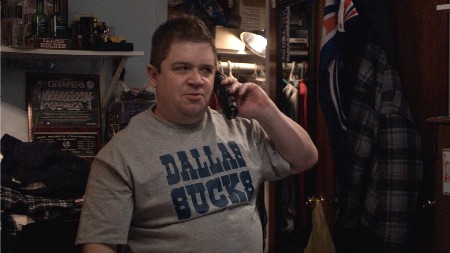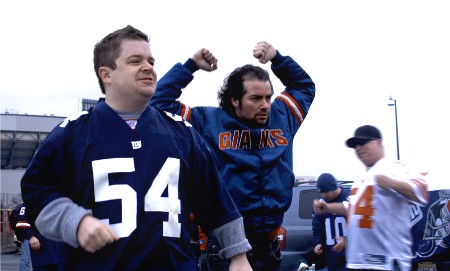Film Review: “Big Fan” Shoots a Freak in a Barrel
Robert Siegel has an undeniable talent for capturing the desperation and despair of his downtrodden character, but the director never tells us why he is plumbing the lower depths of America’s mania for sports.
Big Fan, directed by Robert Siegel, showing at Kendall Square Cinema.
Reviewed by Justin Marble

Stand-up comedian Patton Oswalt plays Paul Aufiero, a lowly parking garage attendant who eats, sleeps, and breathes New York Giants football.
Like Robert Siegel’s first script, “The Wrestler,” his directorial debut “Big Fan” is a dark, intensive character study focused on a man that society has forgotten. Unlike that film, however, “Big Fan” does not look on its main character with sympathy and hope for redemption. Instead, Siegel kicks a man when he’s down. Siegel shows us a freak, a weirdo, and rather than really getting at what makes him tick, he instead simply asks “what the hell is wrong with this guy?”
The social pariah that Siegel has chosen is an intriguing one. Stand-up comedian Patton Oswalt, in his first “serious” role, plays Paul Aufiero, a lowly parking garage attendant who eats, sleeps, and breathes New York Giants football. Aufiero spends his days composing poorly-written rants and calling in to his local radio station, where he butts heads with Eagles fan Philadelphia Phil (Michael Rapaport). Anybody who has listened to sports radio knows the type; the station regulars who call in every week, breathlessly explaining why the team’s defense needs to step it up, or the quarterback needs to find his rhythm, or the head coach needs to be fired. The kind of person who was picked last in gym class, yet never quite got over worshiping their high school quarterback.
Aufiero fits that mold and then some, his idol of choice being the brash fictional linebacker Quantrell Bishop (Jonathan Hamm). When Aufiero and his like-minded friend Sal (Kevin Corrigan) spot Bishop at a Staten Island gas station, they follow him all the way to a strip club in Manhattan. What was supposed to be the meeting of their lives (“we’re big fans”), soon turns violent, and Aufiero is savagely beaten by his own personal hero.
Yet the ensuing suspension of Bishop causes a contradiction in Aufiero’s little fantasy world- with Bishop out, the Giants lose, and he soon finds himself with the power to save the season by dropping the charges. Of course, this course of action is opposed by his mother (Marcia Jean Kurtz), who he still lives with, and his ambulance-chaser brother (Gino Cafarelli), who wants to sue Bishop for all he’s worth.
The casting of Oswalt was an inspired choice, as he has the type of average-Joe aura to make the role really work. In support, Corrigan is subtle and fun to watch as always, and Kurtz is able to make ever conversation with her son painfully awkward. But the cast’s ample efforts are betrayed by Siegel’s artistic inconsistencies.

Fans doing their thing in the film Big Fan
“Big Fan” owes a lot to Martin Scorsese’s often-overlooked “King of Comedy,” which similarly focuses on a loner who lives with mother coming into contact with his idol. Paul’s mother’s comedic interruptions of Paul’s big moment (his late-night calls to the radio station) echo Rupert Pupkin’s mother’s interruptions of him making a comedy tape in his basement, to the point where it is hard to even think of this idea as being truly original. Both films also focus on people who seem pleasant, if not lonely, at first, but mask darker and more disturbing characteristics.
At times, it seems as though Siegel sympathizes with Aufiero, especially when playing him off his sleazy, low-class family. In their world, Paul’s brother Jeff is the pinnacle of success, because he has a tacky commercial on television urging people to call him if they feel they’ve been seriously injured. By comparison, Paul is a disappointment to his mother, who never left the house, never had a girlfriend, and never, in her eyes, amounted to anything. Paul’s utter rejection of her warped values appears to be a small moral victory, until you remember how pathetic he truly is.
And Siegel relishes in showing just how sad Aufiero’s life is. After a particularly searing victory call-in from Philadelphia Phil, Aufiero goes into his regular late-night masturbation session, only to find he can’t get it up. Likewise, after following Bishop to the strip club, Paul and Sal kindly ask the half-naked strippers to move out of the way so they can get a better glimpse of their hero. And Paul’s days are punctuated by borderline pornographic dreams of Bishop, intense and sweating, against a dark background.
Siegel is not subtle and the blatant nature of the psychological drubbing undercuts its effectiveness. Is Paul gay? A man-child who just never developed sexually? Does Siegel think all sports fans secretly lust after their own weekend warriors? Siegel spends too much time getting laughs out of his character’s sexual inferiority, without ever explaining why he is that way. It all feels wrong, somehow. And somewhat pointless.
In “The Wrestler,” or even “King of Comedy,” there are moments where it is revealed why the characters do what they do. This may not make the audience like them, but at the very least they understand them. That moment never really comes in “Big Fan.” On “The Wrestler,” Siegel had the benefit of working with Darren Aronofsky, who brought a lot to the movie in terms of camera movement and streamlining the thematic focus. Here, Siegel seems to be all over the place artistically, is still a novice behind the camera, and can’t truly get his point across in a resonant way. Siegel has an undeniable talent for capturing the desperation and despair of these downtrodden characters, a knack for dialogue, and a skill at creating interesting case-studies. But he could benefit from a visionary director like Aronofsky or Scorsese helping him fully realize his work.
At one point in the film, Aufiero, after being beaten, walks down the street and passes a storefront where containing a sign reading “MALE EGO.” It is scary that Siegel feels he needs to underline his message for the audience — it suggests that he thinks that it, like Aufiero, isn’t all that bright.
